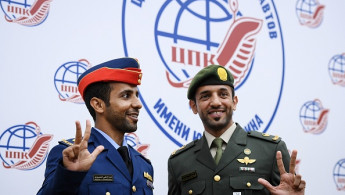UAE astronaut says not required to fast during Ramadan on ISS
Emirati astronaut Sultan al-Neyadi said Wednesday that he will not be required to fast during Ramadan while on his upcoming space mission.
The 41-year-old will become the first Arab astronaut to spend six months in space when he blasts off for the International Space Station (ISS) next month aboard a SpaceX Falcon 9 rocket.
Neyadi, NASA's Stephen Bowen and Warren Hoburg and Russia's Andrey Fedyaev are scheduled to fly to the ISS on February 26 as members of SpaceX Dragon Crew-6.
Asked at a press conference Wednesday how he will observe the holy month of Ramadan, when Muslims typically fast from dawn to sunset, Neyadi said his situation falls under an exception.
"I'm in... the definition of a traveller, and we can actually break fast," Neyadi said. "It's not compulsory."
"Actually fasting is not compulsory if you're... feeling not well," he said.
"So in that regard, anything that can jeopardize the mission, or maybe put the crew members in a risk, we're actually allowed to eat sufficient food."
Neyadi will be the second national from the oil-rich United Arab Emirates to voyage to space.
In September 2019, Hazzaa al-Mansoori spent eight days on the ISS.
The NASA astronauts and Russian cosmonaut were also asked at the Johnson Space center Wednesday whether any of the political tensions on Earth, over Ukraine for example, spilled over into space.
"I've been working and training with cosmonauts for over 20 years now and it's always been amazing," said NASA's Bowen, a veteran of three space shuttle missions.
"Once you get to space, it's just one crew, one vehicle and we all have the same goal."
Fedyaev pointed to the "very long history" of space cooperation between Russia and the United States.
"The life of people in space on the International Space Station is really setting a very good example for how people should be living on Earth," the Russian cosmonaut said.





 Follow the Middle East's top stories in English at The New Arab on Google News
Follow the Middle East's top stories in English at The New Arab on Google News

![MP Essam Diab's pursuit to block TikTok in Egypt has revived an already ongoing debate in the country. [Getty]](/sites/default/files/styles/image_330x185/public/1230748046.jpeg?h=a5f2f23a&itok=-8MqBLLC)
